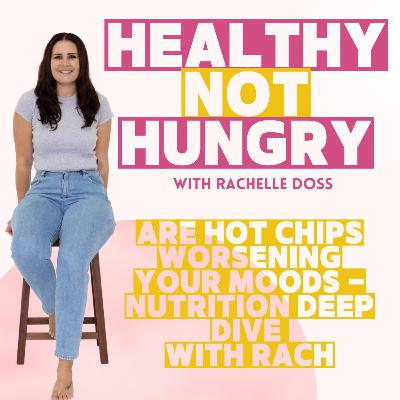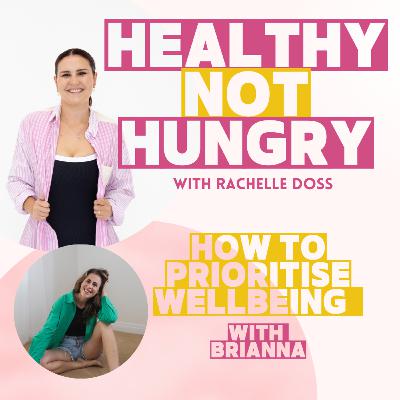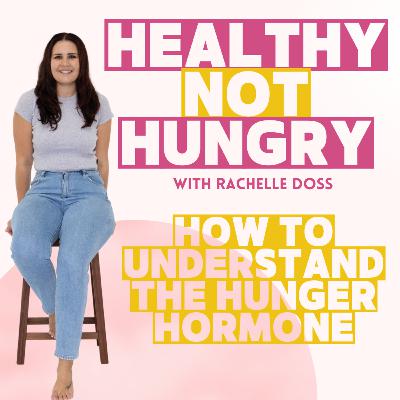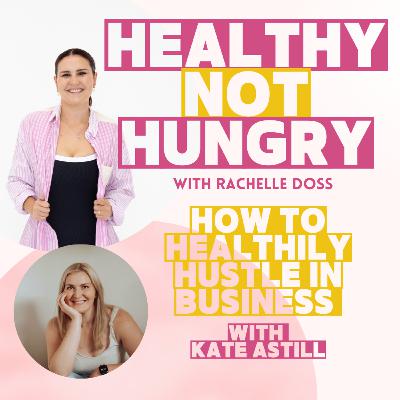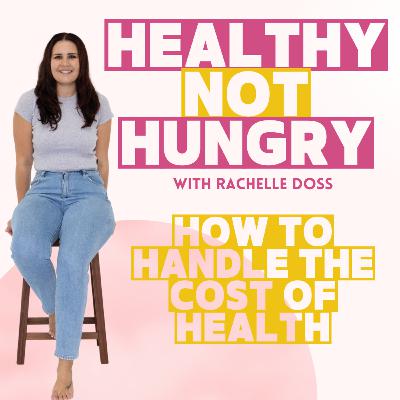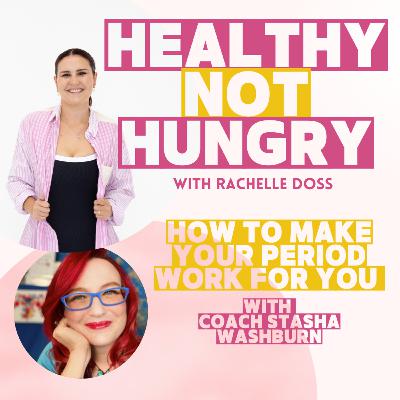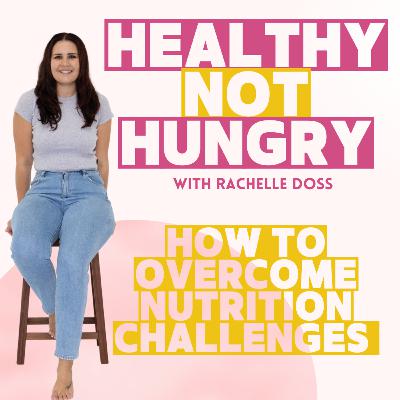Discover Healthy NOT Hungry
Healthy NOT Hungry

Healthy NOT Hungry
Author: Rachelle Doss
Subscribed: 3Played: 17Subscribe
Share
© Rachelle Doss
Description
Hosted by nutritionist and personal trainer Rach Doss, this is your how to guide for redefining what healthy means for eating, exercise and mindset. If it's related to your health and wellbeing, we have you covered, from specialists in different modalities to personal health journeys let us inspire, educate and motivate you to live your healthiest but also happiest life.
109 Episodes
Reverse
In this episode, Rach discusses the critical role of protein in breakfast and its numerous benefits for health, including muscle growth, energy levels, and appetite regulation. She emphasizes the importance of starting the day with a high protein meal and provides practical tips for incorporating protein into breakfast, regardless of personal preferences or time constraints.high protein breakfast, nutrition, muscle growth, energy levels, appetite regulation, cognitive function, healthy eating, protein intake, metabolism, cravings
In this insightful conversation, Dr. Tina Schermer Sellers discusses the critical importance of comprehensive sex education and its impact on individual wellbeing. She emphasizes the need to address sexual shame and the role of pleasure and connection in fostering healthy relationships. The discussion also highlights the importance of empowering parents to have open conversations with their children about sexuality, boundaries, and self-acceptance. Dr. Sellers provides valuable resources for parents and caregivers to help navigate these essential topics.sex education, sexual health, sexual shame, wellbeing, parenting, intimacy, pleasure, connection, emotional intelligence, responsive desirehttps://www.instagram.com/drtinashameless?utm_source=ig_web_button_share_sheet&igsh=eGpuOXdyaXRteG1yhttps://msha.ke/tinaschermersellers?fbclid=PAZXh0bgNhZW0CMTEAAad49Jm4VWRKAmdi1axIBw8w09-R5NLSQHCyNwuOkV8DTyfKI7tu5UEJjI2FBg_aem_CGK9YhicdjgFmUmI_5vQhQ
n this enlightening episode, we explore the profound connection between color analysis, wardrobe choices, and mental well-being. Learn how selecting the right colors and styles can not only boost your confidence but also positively influence your mental health. Our expert Mimi Upton shares insights on how understanding your personal colour palette and curating a wardrobe that resonates with your identity can lead to a more empowered and balanced life. Tune in to discover the transformative effects of dressing with purpose and how it can enhance both your self-esteem and overall well-being.https://www.theluxestyle.studio/https://www.instagram.com/theluxestyle.studio?utm_source=ig_web_button_share_sheet&igsh=MXd2cDZrc3g0YXJt
In this enlightening episode, we explore the profound connection between color analysis, wardrobe choices, and mental well-being. Learn how selecting the right colors and styles can not only boost your confidence but also positively influence your mental health. Our expert Mimi Upton shares insights on how understanding your personal colour palette and curating a wardrobe that resonates with your identity can lead to a more empowered and balanced life. Tune in to discover the transformative effects of dressing with purpose and how it can enhance both your self-esteem and overall well-being.https://www.theluxestyle.studio/https://www.instagram.com/theluxestyle.studio?utm_source=ig_web_button_share_sheet&igsh=MXd2cDZrc3g0YXJt
In this episode, Rach discusses the limitations of meal and exercise plans, emphasising that they are not suitable for everyone. She explores the reasons why traditional plans may fail, including personality types, lifestyle changes, and the overwhelming nature of multiple changes at once. Rachelle advocates for a more individualised approach to health and wellness, encouraging listeners to set achievable goals and make gradual changes. She introduces her Health Strategy Sessions as a solution for those struggling with conventional plans, offering personalised support and strategies for sustainable habits.meal plans, exercise plans, health strategies, individualized approach, sustainable habits, nutrition, wellness, personal growth, goal setting, mental health
TRIGGER WARNING - THIS EPISODE CONTAINS CONTENT DISCUSSING DISORDERED EATING, PLEASE SKIP THIS EPISODE IF IT'S NOT RIGHT FOR YOU CURRENTLY. In this episode of Healthy Not Hungry, host Rach speaks with Mallory Tarpley, an assistant professor and author of the book 'Slip: Life in the Middle of Eating Disorder Recovery.' They discuss Mallory's personal journey with eating disorders, the complexities of recovery, and the importance of sharing experiences. Mallory emphasizes the concept of the 'middle place' in recovery, where individuals may not be fully recovered but are still making progress. The conversation also touches on the societal perceptions of eating disorders, the need for a more nuanced understanding of recovery, and the significance of support systems in navigating these challenges.eating disorders, recovery, mental health, memoir, journalism, personal narrative, motherhood, body image, mental health awareness, support systemshttps://www.mallarytenoretarpley.com/For help or support on this topic, please reach out for help! https://butterfly.org.au/?gad_source=1&gad_campaignid=17678229317&gbraid=0AAAAADBtQWQejkXYCtziGXXFm_OhjXpBv&gclid=CjwKCAjw3_PCBhA2EiwAkH_j4qowrPaoOv-3xLWIfFh6fqz-95V7I8OA_u1BG7-NiMShBggqtTYzqxoCuX0QAvD_BwE
In this episode, Rach discusses the concept of hybrid training, a blended approach that combines various training methods to optimise health and fitness. She shares her personal experiences with different exercise modalities, emphasising the importance of enjoyment and variety in maintaining a consistent workout routine. Rachelle highlights the benefits of hybrid training, including improved strength, cardiovascular health, and overall well-being, while encouraging listeners to explore different forms of exercise that suit their individual needs.hybrid training, fitness, exercise, health, workout, strength training, cardio, Pilates, yoga, wellness
In this episode of Healthy Not Hungry, host Rach speaks with Katie, a personal trainer and breath work coach, about her journey as a single mother and fitness professional. They discuss the importance of self-worth, setting boundaries, and embracing discomfort for personal growth. Katie shares her holistic approach to fitness, emphasizing the need for women to feel confident in their own skin rather than focusing solely on aesthetic goals. The conversation highlights the challenges of motherhood and the societal pressures women face, while encouraging listeners to prioritize self-care and discover their true purpose.https://kfithealthandtraining.com/?fbclid=PAZXh0bgNhZW0CMTEAAae55MTOjcKaMUsapY1ZqbBlcb4qiWfiTf82CVlK1rZczJsamKnsg0M3qGHGWQ_aem_BubPejC9sSxRyh67o35Qpgpersonal training, self-development, motherhood, fitness, self-care, boundaries, self-worth, holistic health, personal growth, mindset
In this episode, Rach discusses the critical role of carbohydrates in health and wellbeing, emphasising their importance alongside protein. She explains how carbohydrates are essential for energy, muscle preservation, brain function, and hormonal balance. Rachelle debunks the myth that carbs are detrimental to health, highlighting their benefits for mental clarity, mood stability, and recovery from exercise. She encourages listeners to consider their carbohydrate intake and its impact on their overall health and performance.carbohydrates, glycogen, mental health, nutrition, protein, energy, weight loss, brain function, hormonal balance, wellbeing
In this episode of Healthy Not Hungry, Rach discusses the negative impact of poor dietary choices on mental health. She explores various factors such as blood sugar levels, nutrient intake, gut health, hydration, meal frequency, and sleep quality, emphasizing the importance of a balanced diet for emotional wellbeing. Rachelle provides insights into how these elements are interconnected and how they can contribute to mental health issues if neglected.takeawaysEating badly can worsen mental health.Blood sugar crashes lead to irritability and anxiety.Low nutrient intake is linked to low mood and depression.Gut health is crucial for mental wellbeing.Highly processed foods can cause mental fatigue.Dehydration can mimic anxiety symptoms.Skipping meals increases cortisol and stress.Poor nutrition can disrupt sleep quality.Nutrition, hydration, and sleep are interconnected.A balanced diet is essential for mental health.
In this episode of Healthy Not Hungry, host Rachelle Doss speaks with Erin Clifford, a corporate wellness consultant and author of 'Wellness Reimagined.' They discuss Erin's journey from teaching to health coaching, the importance of food in wellness, and how nutrition impacts mental health. Erin emphasises the need for a personalised approach to wellness, advocating for harmony in life rather than strict balance. The conversation highlights practical strategies for integrating wellness into busy lives and the significance of aligning actions with personal values.TakeawaysErin Clifford emphasises the importance of work-life harmony over balance.Wellness is a personalised journey; there's no one-size-fits-all approach.Food plays a crucial role in both physical and mental health.Emotional aspects of eating should be considered in wellness plans.Small, manageable changes can lead to significant improvements in health.Planning meals ahead can help maintain a healthy diet.It's important to give yourself grace when you fall off track.Aligning your actions with your values is key to fulfilment.Food can be both nourishment and a source of joy.Mental health can be positively influenced by dietary choices.https://erincliffordwellness.com/https://www.instagram.com/erinwellness/
📌 Episode SummaryIn this solo episode of Healthy Not Hungry, Rach dives deep into the psychology and physiology behind cravings and emotional eating. Ever wondered why your brain tells you to reach for chocolate mid-afternoon? Or why resisting cravings sometimes backfires? This episode explains the brain-body connection, how stress and blood sugar crashes affect cravings, and a simple, sustainable strategy to manage them—without guilt or food obsession.You'll learn how inner health creates outer health, and why a balanced mindset is essential for long-term fat loss success.What cravings really are and where they come from (hint: it starts in your brain 🧠)The science of dopamine, cortisol, and the craving loopHow blood sugar crashes and nutrient deficiencies trigger emotional eatingWhy hydration and protein are key to reducing sugar cravingsA step-by-step framework to decide whether to give in or fuel firstHow to manage cravings without guilt, restriction, or sabotaging your goalsWhy mindset and emotional wellbeing are crucial for sustainable fat lossemotional eatingfood cravingscravings and mindsetbrain body connectionmental health and weight lossfat loss for womenwomen and emotional eatinghow to stop sugar cravingsstress and cravingssustainable weight lossbalanced eatingmindset for fat lossfood freedom after 40hormones and cravingsstop binge eatingFuel your body first, listen with curiosity, and respond with kindness—not punishment. Your cravings aren't the enemy; they’re messengers from your body and mind. Learn to decode them, not deny them.Follow the podcast on Instagram and join the conversation on Facebook at Healthy Not Hungry. Have a question or a topic request? Slide into the DMs or leave a voice note—Rach would love to hear from you!💡 What You’ll Learn in This Episode🔑 Keywords to Boost SEO❤️ Episode Takeaway📲 Let’s Connect!
In this episode of Healthy Not Hungry we are joined by Dr Bree Hurn as we discuss all things habits, how they contribute to our health and wellbeing, how to figure out which habits you should be making and breaking and how to actually make a habit stick! Get empowered through being educated on habits and how you can use this tool to redefine your description of healthy.Bree Hurn works as a lecturer at The Faculty of Education at the University of Melbourne. With over 20 years experience, Bree has been a teacher, school leader, and education writer before undertaking a PhD in 2019. Passionate about communicating the research into how positive habits help people improve their lives, Bree supports professionals as a coach, consultant and keynote speaker. Bree also hosts her own podcast show, called 'The Habit Nerd'.
In this episode, Rach explores a surprising connectionbetween hot chips and our moods. Join her as she delves into research suggesting that these popular comfort foods might be linked to increased feelings of anxiety and depression for some individuals.What does being "healthy" really mean?The concept of comfort foods and their potential impacts on mental health.Rach shares personal insights from keeping a food log for her daughter, Holly, who experiences anxiety.Research findings on acrylamide, a compound formed when starchy foods are cooked at high temperatures.The link between frequent fried food consumption and higher risks of anxiety and depression, according to studies involving over 160,000 participants.Individual differences in how foods affect moods.Highlights:Rach’s observations of how hot chips affected her daughter'smood and experiments with dietary changes.The surprising health effects of acrylamide and how it formsin various foods, including chips and fries.Practical tips for listeners on monitoring their own foodintake and mood correlations.Takeaways:Not all comfort foods may actually comfort you; consider howyour body reacts to different foods.Keeping a food and mood log can be an effective way toidentify what affects your emotional wellbeing.Moderation is key: it’s possible to enjoy hot chips whilestill being mindful of their impacts on mood.YOU CAN ASK any NUTRITION and WELLNESS QUESTIONS.We would love to answer them for you and have you on and help everyone else out there because I think this is the right thing.So if you're brave enough to put it out there, it's completely anonymous. It may not just help you and give you that nutritionist knowledge for free, and help others with the same questions or issues.Please don't forget to like and follow us here and to all of our social media accounts!Linktree: https://linktr.ee/healthynothungrypodcastOfficial IG: https://www.instagram.com/healthynothungrypodcast/Official FB Page: https://www.facebook.com/profile.php id=100067969951093Official FB Group: https://www.facebook.com/groups/healthynothungry
In this episode of Healthy Not Hungry, host Rach welcomesBree, an online health and wellbeing coach, to discuss the importance of a balanced approach to health and wellness. Bree shares her personal journey from being a social worker to an online coach, highlighting the struggles many womenface in achieving wellbeing amid the pressures of motherhood. Together, they explore the significance of community, accountability, and small, sustainable changes to improve mental and physical health.Key Points Discussed:The reality of motherhood and the feelings of isolation many women experience.The importance of community and shared experiences for mental health.Bree's shift from an all-or-nothing mentality to a balanced, realistic approach to wellness.Tips for starting small with health changes, including:Incorporating movement into daily activities.Focusing on one meal at a time for nutritional improvements.The need for accountability and the various support options available, including coaching and mental health resources.Listen to Bree’s podcast: Mindset to Movement (available on Spotify and Apple Podcasts)Suggested online communities and resources foraccountability and support.Beyond Blue - A mental health support service inAustralia.Change doesn’t have to be overwhelming. Start small and be patient with yourself. It's about making consistent, achievable progress towards your health goals while remembering to prioritise your wellbeing.Connect with Briana:Follow on Instagram: https://www.instagram.com/mindsettomovement_brianna/Follow the Facebook: https://www.facebook.com/profile.php?id=61553007230406Official website: https://www.mindsettomovement.com.au/YOU CAN ASK any NUTRITION and WELLNESS QUESTIONS.We would love to answer them for you and have you on and help everyone else out there because I think this is the right thing.So if you're brave enough to put it out there, it's completely anonymous. It may not just help you and give you that nutritionist knowledge for free, and help others with the same questions or issues.Please don't forget to like and follow us here and to all of our social media accounts!Linktree: https://linktr.ee/healthynothungrypodcastOfficial IG: https://www.instagram.com/healthynothungrypodcast/Official FB Page: https://www.facebook.com/profile.php id=100067969951093Official FB Group: https://www.facebook.com/groups/healthynothungry
In this solo episode of Healthy Not Hungry, hostRachel Doss dives deep into the fascinating world of ghrelin, the hormone responsible for regulating hunger and appetite. With a focus on practical tips, Rachelle explores how understanding ghrelin can help manage cravings and promote healthier eating behaviours.What ghrelin is, where it’sproduced, and its role as the "hunger hormone."Ghrelin’s Impact on Hunger and Cravings How ghrelin levels influence appetite, food-seeking behaviour, and cravings for high-calorie foods.Effects of Diet and Lifestyle on Ghrelin The relationship between calorie restriction, sleep deprivation, stress, and ghrelin regulation.Practical Strategies for Managing Ghrelin Levels Tips on nutrition, including balanced meals, protein intake, hydration, and mindful eating to keep ghrelin levels stable.The Importance of Self-Care for Hormonal Balance How managing stress and ensuring adequate sleep can help regulate appetite and cravings.Key Takeaways:Balanced Meals Eating smaller, balanced meals throughout the day can help keep ghrelin levels stable and prevent extreme hunger.Protein Intake Ensuring adequate protein in your diet can reduce ghrelin secretion and help to control cravings.Sleep Aim for 7-9 hours of sleep each night to supporthormonal balance.Hydration Staying hydrated can mitigate the feelings ofhunger mistaken for thirst.Mindful Eating Practicing mindful eating can help yourecognise true hunger cues versus emotional triggers for eating.Stress Management Finding ways to manage stress is crucialfor maintaining hormonal balance and preventing emotional eating.YOU CAN ASK any NUTRITION and WELLNESS QUESTIONS.We would love to answer them for you and have you on and help everyone else out there because I think this is the right thing.So if you're brave enough to put it out there, it's completely anonymous. It may not just help you and give you that nutritionist knowledge for free, and help others with the same questions or issues.Please don't forget to like and follow us here and to all of our social media accounts!Linktree: https://linktr.ee/healthynothungrypodcastOfficial IG: https://www.instagram.com/healthynothungrypodcast/Official FB Page: https://www.facebook.com/profile.php id=100067969951093Official FB Group: https://www.facebook.com/groups/healthynothungry
In this episode of Healthy Not Hungry, host Rach speaks with Kate Astill, a business and social media coach passionate about helping female entrepreneurs find alignment in their business and personal lives. They discuss the shift from hustle culture to a more balanced approach to work and wellbeing, the importance of boundaries, and the concept of self-care as it relates to personal fulfilment.Redefining Health and Success: Understanding what healthy and successful living meansbeyond just hustle.Kate’s Journey: From medical scientist to business coach, Kate shares herbackground and how her experiences shaped her approach to wellness and business.Women in Business: The unique challenges faced by women, including balancingmultiple roles and responsibilities, and the importance of finding harmony in life and work.Self-Care Misconceptions: Exploring how self-care can be practical and personalisedrather than just luxury activities.Burnout Prevention: Recognising signs of burnout and establishing boundaries toprotect your wellbeing.Practical Tips: Strategies for reassessing commitments, delegating tasks,and prioritising self-care.You can follow Kate through her social media accounthttps://www.instagram.com/kateastill_/ YOU CAN ASK any NUTRITION and WELLNESS QUESTIONS.We would love to answer them for you and have you on and help everyone else out there because I think this is the right thing.So if you're brave enough to put it out there, it's completely anonymous. It may not just help you and give you that nutritionist knowledge for free, and help others with the same questions or issues.Please don't forget to like and follow us here and to all of our social media accounts!Linktree: https://linktr.ee/healthynothungrypodcastOfficial IG: https://www.instagram.com/healthynothungrypodcast/Official FB Page: https://www.facebook.com/profile.php id=100067969951093Official FB Group: https://www.facebook.com/groups/healthynothungry
In this episode of Healthy Not Hungry, Rachelle dives into the often-overlooked topic of health expenses. She discusses the significance of maintaining a healthy lifestyle while managing finances, providing practical insights and strategies to help listeners prioritise their wellbeing without breaking the bank. Key Points Discussed:Introduction to Health Expenses: Understanding the average spending on health per person in Australia and the rising cost associated with chronic health conditions.Preventative Health vs. Chronic Illness: Insight into how investing in preventative measures can reduce overall healthcare costs and improve wellbeing.Personal Budgeting for Health: Tips on evaluating your spending habits and recognising where savings can be made to prioritise health, such as reducing unnecessary expenditures like frequent coffees or subscriptions.Cost-Effective Health Practices: Exploring free or low-cost options for maintaining health, such as home workouts, outdoor activities, and community resources.Life Audit: A guided exercise for listeners to assess their health, happiness, and where they can make improvements without significant financial burden.Mental Health Considerations: The importance of addressing mental wellbeing as part of overall health expenditures.Actionable Steps:Conduct a Life Audit: Assess your current health and determine areas needing improvement.Evaluate Spending: Identify non-essential expenditures that can be adjusted to allocate funds towards your health.Seek Free Resources: Explore nearby parks with exercise equipment or community health programs.Invest in Preventative Measures: Budget for regular check-ups or consultations with health professionals to avoid costly health issues later.Words to Remember:"You are your biggest investment; it’s okay to spend time, energy, or money on your health.""Health is wealth. Once it’s gone, it’s harder to get back." YOU CAN ASK any NUTRITION and WELLNESS QUESTIONS.We would love to answer them for you and have you on and help everyone else out there because I think this is the right thing.So if you're brave enough to put it out there, it's completely anonymous. It may not just help you and give you that nutritionist knowledge for free, and help others with the same questions or issues.Please don't forget to like and follow us here and to all of our social media accounts!Linktree: https://linktr.ee/healthynothungrypodcastOfficial IG: https://www.instagram.com/healthynothungrypodcast/Official FB Page: https://www.facebook.com/profile.php id=100067969951093Official FB Group: https://www.facebook.com/groups/healthynothungry
In this episode, Rach interviews Tasha Washburn, a period coach and founder of Period Coaching School, about redefining our understanding of menstrual cycles. They discuss how periods are often viewed as an inconvenience, but can actually be a powerful tool for women. Tasha shares insights on working with your cycle, aligning your lifestyle with hormonal phases, and the importance of nutritional and lifestyle choices for hormonal health.Key Takeaways:Redefining Periods: Shifting the perception of periods from a burden to an asset.Cycle Awareness: Understanding the different phases of the menstrual cycle and their impact on energy, mood, and productivity.Hormonal Health: The importance of nutrition, lifestyle, and stress management in supporting hormonal balance.Working with Your Cycle: Aligning work and personal activities with the different phases of your cycle for optimal well-being.Food and Hormones: Eating according to your cycle can significantly impact your hormonal health.Sensory System and Hormones: How scents and other sensory inputs can influence hormone production and stress levels.Birth Control and Hormones: Understanding the effects of hormonal birth control and exploring alternative options.Period Coaching: The role of period coaches in providing education and support for menstrual health.If you are interested to avail the service of Coach Tasha Washburn, you can contact her through:https://www.facebook.com/StashaWashburn/ https://www.instagram.com/stashawashburn/ https://theperiodcoach.com/Revolution/https://periodcoachingschool.com/YOU CAN ASK any NUTRITION and WELLNESS QUESTIONS.We would love to answer them for you and have you on and help everyone else out there because I think this is the right thing.So if you're brave enough to put it out there, it's completely anonymous. It may not just help you and give you that nutritionist knowledge for free, and help others with the same questions or issues.Please don't forget to like and follow us here and to all of our social media accounts!Linktree: https://linktr.ee/healthynothungrypodcastOfficial IG: https://www.instagram.com/healthynothungrypodcast/Official FB Page: https://www.facebook.com/profile.php id=100067969951093Official FB Group: https://www.facebook.com/groups/healthynothungry
In this solo episode, Rachelle Doss dives into the mostcommon nutrition challenges faced by individuals on their health journeys.Drawing from her experiences as a clinical nutritionist and personal trainer, Rachelle addresses vital mindset shifts needed to achieve sustainable results in nutrition.Get ready to gain valuable insights and practical tips tonavigate your own path to health and wellbeing.Focus of the Episode: Nutrition ChallengesChallenge #1: Slow Progress Rach discusses the importance of realistic expectations whenit comes to weight loss.Challenge #2: Adapting Diet to Your Lifestyle Rach encourages listeners to examine their routines,especially on weekends, and adapt their meal plans to fit their lifestyle.Challenge #3: The “Why Bother” Attitude Discussion on how to combat feelings of defeat when plans go awry.Rach emphasises the importance of shifting focus from what’s been missed to the positive strides made.Beyond the Scales: Setting Holistic Health Goals Understanding the broader benefits of healthy habits, likeincreased energy and better mood, instead of just focusing on weight metrics.YOU CAN ASK any NUTRITION and WELLNESS QUESTIONS.We would love to answer them for you and have you on and help everyone else out there because I think this is the right thing.So if you're brave enough to put it out there, it's completely anonymous. It may not just help you and give you that nutritionist knowledge for free, and help others with the same questions or issues.Please don't forget to like and follow us here and to all of our social media accounts!Linktree: https://linktr.ee/healthynothungrypodcastOfficial IG: https://www.instagram.com/healthynothungrypodcast/Official FB Page: https://www.facebook.com/profile.php id=100067969951093Official FB Group: https://www.facebook.com/groups/healthynothungry



